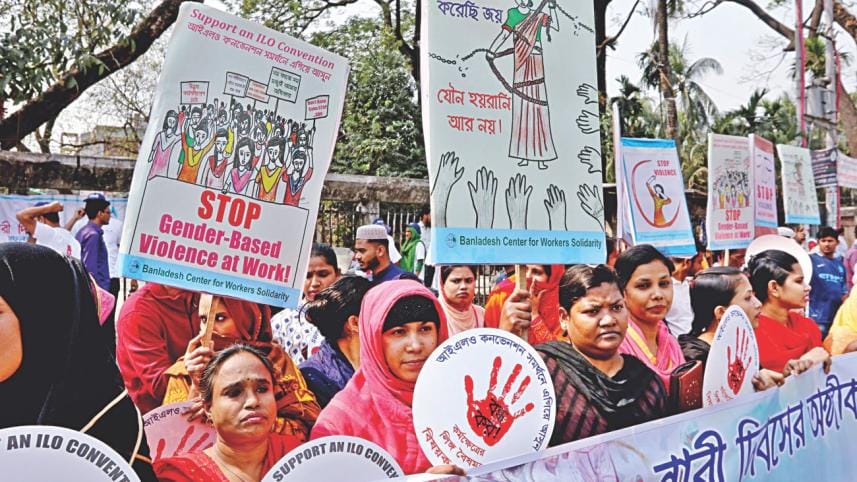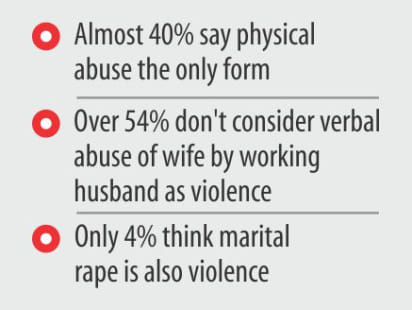Violence Against Women: Not all forms recognised


More than 40 percent people in Bangladesh consider physical abuse to be the only form of violence against women, according to a Brac study.
It said threat of divorce, marital rape and creating fear of violence are the three least recognised forms of the violence.
Besides, one in every four surveyed does not know that “eve-teasing” is sexual violence. To them, it's a “normal behaviour of boys and young men”, the study said.
The non-government organisation's Advocacy for Social Change department surveyed 4,800 people across all 64 districts last month for the study.
Bangladeshis aged 18 and above from different administrative areas, socioeconomic classes, genders and professions were the respondents. The survey had equal male and female representation. The aim of the survey was to have an understanding of the common perceptions about violence against women in Bangladesh.
At first, the study participants were given a case study which described how a working husband regularly abuses his wife verbally. Asked, more than half of the respondents (54 percent) said that was not violence at all.
The participants were given another case study on the stalking of a girl on her way to and from school and asked whether her father did the right thing by not protesting the incident.
As much as 80 percent of them said the father should have protested. Fifteen percent -- 92 percent of them women -- said it was not safe to stand against stalkers on the streets.
Asked why they used case studies in the survey, Moutushi Kabir, director of communications at Brac, said, "Seeing a situation as a third person often brings out authentic, impersonal and objective responses. So, we used case studies in order to make sure that the respondents remained impartial and unprejudiced."
Six out of 10 people surveyed said they understood that mental torture -- which includes creating pressure for dowry, threat of divorce and “not talking” -- is also violence against women.
Marital rape turned out to be one of the least understood forms of violence against women, with only 4 percent considering it to be one.
Only 1.1 percent respondents thought threat of divorce is a form of violence and 6.9 percent recognised creating fear of violence as a type of violence against women.
Besides, more than nine out of the 10 respondents said they were not happy with the way the media reports incidents of violence against women.
Around 25 percent thought that the media should refrain from giving vivid description of such incidents and stop publishing the identity of the victims.
They also said indecent representation of women in popular culture and pornographic content in digital and offline media instigated the tendency among men to inflict sexual violence on and harsh behaviour towards women.
The study notes violence against women is one of the most pervasive and fundamental violations of human rights and it's also one of the most under-recognised problems in Bangladesh.
It went on to explore the root causes of violent behaviour against women.
Around half of the respondents said violence against women was on the rise due to an overall lack of values in today's society.
The study also said one fourth of the respondents had thought that a lack of proper execution of law had also resulted in the rise in the violence.
The director of communications at Brac, Moutushi, said, "The question of morality is deep rooted in the very fabric of our society. We need to relook at the power play of patriarchy in our social value system, which comprises family, education system and culture.”
She also said, “The traditional definition of masculinity has to change and a good starting point could be ensuring gender sensitive education for adolescents and an enabling environment for women everywhere.
"Raising awareness and strong enforcement of law should go hand in hand. They're not mutually exclusive because the targets are different. Raising awareness is for all and it helps in preventing violence. Stronger law enforcement, meanwhile, will ensure that perpetrators will always fear the consequence,” Moutushi added.




 For all latest news, follow The Daily Star's Google News channel.
For all latest news, follow The Daily Star's Google News channel.
Comments